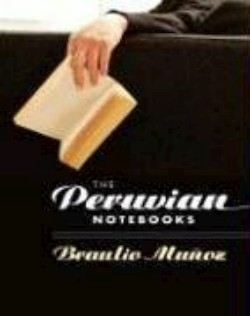The Peruvian Notebooks
Here’s a story deeply involved with two languages, their attendant cultures, and how they interlace. Antonio Alday Gutiérrez, a Peruvian import to the outskirts of Philadelphia, isn’t really sure about anything, except on those occasions when he feels sure about an everything that keeps turning itself upside-down. Flashbacks, dreamscapes, and a sense of shifting identity provide a rocky road for Alday, reborn in his own mind as Anthony (sometimes even Tony) Allday for his eventual incarnation as an aspiring American.
The author presents his novel in an English text heavily larded with Spanish words and phrases usually followed with a loose English translation. Himself a native-born Peruvian, with years of academic experience in a number of American universities, he is uniquely equipped to handle his task. Interestingly, this bilingual effort flows smoothly as a kind of afterthought in Alday’s speech, as through it were an effort to think in both languages almost simultaneously.
Written in a rather Virginia Woolfian style, the narrative concerns itself less with actual events than with a panoramic view of how these events enter the psyche of the protagonist. It’s rare to encounter in fiction such a potpourri of mental, emotional, and psychological ambivalence. Half-crazy with guilt, rage, and embarrassment for his origins, and almost heroic in his determination to achieve the status that his dreams of America promised, Alday is split right down the middle:
In hours spent before the mirror, he imagined being dressed in a black tuxedo, cashmere scarf dangling from his neck, offering Chesterfields out of the thinnest golden case … exchanging glances with well-coiffed women in summer evening gowns. … He imagined himself in complete possession of the slightly crooked smile of Robert Wagner and the utter confidence of Clark Gable.
Finally confronted with the crisis he has feared—the arrival of a cousin who is sure to catch him in the lies he has written home, his desperation leads the reader to an anti-climax of resolution. The final paragraph stays suspended in a fog of uncertainty. Will he escape the consequences of his actions? His accomplished biographer spares us the appearance of a Deus ex machina and leaves his tortured sinner to the machinations of a frivolous Fate.
Not the least of the delights of vocabulary here is the opportunity to compare Peruvian and American cusswords. The appearance of the word carajo on every other page reporting the hero’s verbal excesses stimulates speculation. Maybe Alday’s use of that untranslatable word only means that he hasn’t yet discovered an American epithet that doesn’t mean anything except the urge to protest.
Disclosure: This article is not an endorsement, but a review. The publisher of this book provided free copies of the book to have their book reviewed by a professional reviewer. No fee was paid by the publisher for this review. Foreword Reviews only recommends books that we love. Foreword Magazine, Inc. is disclosing this in accordance with the Federal Trade Commission’s 16 CFR, Part 255.

